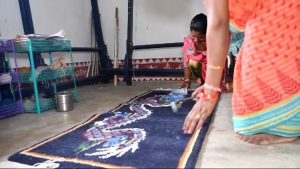Berhampur: The traditional hand-woven carpet has paved the way for economic upliftment and better livelihood of tribal communities in three villages of Odisha’s Gajapati district.
Total 15 tribal women Sikulipadar village under Mohana block and adjoining Nilakunti and Baghamari villages in the district underwent training on weaving the carpet from Tibetan women at Chandragiri Settlement base near their villages for six months.
After the skill development training, these tribal women started weaving the carpets on their own. They are now producing different varieties of carpets which are fetching good prices in the market.
Till now, they have earned Rs 27,000 from the sale of their handmade carpets. Each carpet costs Rs 3,000 to 6,000 and it took them around 15 days to complete a carpet.

“We never expected to earn so much from weaving carpets, ” said Kesomani Raito, Madhusmita Gamango and Esoswini Raito, who had undergone skill training. The financial condition of their families was very weak earlier.
“We are purchasing raw materials from Tibetans Multipurpose Cooperative Society and then weaving the carpets on our own,” they said.
The economic empowerment of the tribal women was taken up by the Society for the Welfare of Weaker Sections (SWWS), a leading organisation in the district, working in Mohana block under Odisha Primitive Empowerment & Livelihoods Project (OPELIP). It is supported by Soura Development Agency (SDA) of Chandragiri.
The carpet weaving craft has been practised by the nomad communities in Tibet for over 100 years. The technique is different from the Persian or the Turkish methods. The handwoven carpet is traditionally made from the wool of sheep, but cotton warps are common now-a-days.
The wollen carpets are decorated with the designs of birds, dragons and natural sceneries. It can be used on floors, wall hanging, saddles and seating carpet. Tibetan carpet is in high demand in the international market, sources said.
But the traditional carpet weaving is a dying art form among the Tibetans. The young generation is not keen on the following the tradition as it is labour intensive.


